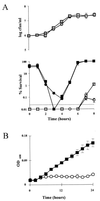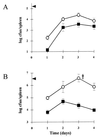Identification and disruption of lisRK, a genetic locus encoding a two-component signal transduction system involved in stress tolerance and virulence in Listeria monocytogenes
- PMID: 10542190
- PMCID: PMC94153
- DOI: 10.1128/JB.181.21.6840-6843.1999
Identification and disruption of lisRK, a genetic locus encoding a two-component signal transduction system involved in stress tolerance and virulence in Listeria monocytogenes
Abstract
lisRK encodes a two-component regulatory system in the food pathogen Listeria monocytogenes LO28. Following identification of the operon in an acid-tolerant Tn917 mutant, a deletion in the histidine kinase component was shown to result in a growth phase variation in acid tolerance, an ability to grow in high ethanol concentrations, and a significant reduction in virulence.
Figures


 and ░⃞, respectively). Points below the
dotted line indicate that there were no survivors. (B) Growth of LO28
(○) and LO28ΔlisK (■) in TSB-YE supplemented with 5%
ethanol at 37°C. Error bars represent the standard deviations of
triplicate experiments. OD600, optical density at 600 nm.
and ░⃞, respectively). Points below the
dotted line indicate that there were no survivors. (B) Growth of LO28
(○) and LO28ΔlisK (■) in TSB-YE supplemented with 5%
ethanol at 37°C. Error bars represent the standard deviations of
triplicate experiments. OD600, optical density at 600 nm.
References
-
- Bielecki J, Youngman P, Connelly P, Portnoy D A. Bacillus subtilis expressing a haemolysin gene from Listeria monocytogenescan grow in mammalian cells. Nature. 1990;345:175–176. - PubMed
-
- Brown J L, Ross T, McMeekin T A, Nichols P D. Acid habituation of Escherichia coliand the potential role of cyclopropane fatty acids in low pH tolerance. Int J Food Microbiol. 1997;37:163–173. - PubMed
-
- Chou L S, Weimer B. Isolation and characterization of acid- and bile-tolerant isolates from strains of Lactobacillus acidophilus. J Dairy Sci. 1999;82:23–31. - PubMed
-
- Correa O S, Rivas E A, Barneix A J. Cellular envelopes and tolerance to acid pH in Mesorhizobium loti. Curr Microbiol. 1999;38:329–334. - PubMed
Publication types
MeSH terms
Substances
Associated data
- Actions
LinkOut - more resources
Full Text Sources
Medical

